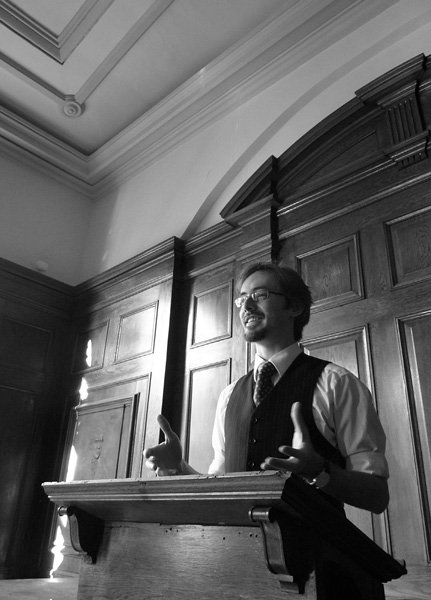
SEEING SOMETHING SO BIG IT’S INVISIBLE
first performed on
October 12, 2011
Divinity Chapel, Harvard Divinity School, Cambridge, MA
performed twice in 2011
CHRISTOPHER MICHAEL LUNA
Newton, MA
733746426c733746426h733746426r733746426i733746426s733746426t733746426o733746426p733746426h733746426e733746426r733746426_733746426l733746426u733746426n733746426a733746426@733746426m733746426a733746426i733746426l733746426.733746426h733746426a733746426r733746426v733746426a733746426r733746426d733746426.733746426e733746426d733746426u
christophermluna.com
SEEING SOMETHING SO BIG IT’S INVISIBLE
CHRISTOPHER MICHAEL LUNA
I hoped to engage an audience of diverse religious backgrounds with a sermon preached from a non-traditional perspective, drawing on a work of literature rather than a scripture. My aim was to use the voice of the pulpit, which traditionally speaks with a kind of spiritual authority, to address the difficulty of studying religion from a position of power and privilege.
To this aim, I preached from a passage from Virginia Hamilton’s The Planet of Junior Brown, likening the dynamics between white institutionalized systems that attempt to assimilate black characters in the book, to the reader’s reaction of the terrifying otherness of the schizophrenic main character. I focused on a symbolic checker game between the main character and his best friend, in which the main character refuses to play black because “black always wins.” First explaining the significance of the red/black symbolism in which the schizophrenic character must take the losing position in the game, I then drew parallels between the checker game of the characters and a tacit chess game between the black author and the symbolically white reader, who engages the text from a position of comfort and ease. As the black player must shock the white player in chess in order to gain the advantage, so I argued that Hamilton shocks the reader with the sudden revelation of the main character’s condition.
After the sermon, one member of the audience asked whether I would consider doing the same sermon drawing on scripture. I explained that it was my hope to show that the poetic inspiration that underlies scripture can be found in other works of literature and could be effectively used to convey spiritually potent messages. Another member of the audience said that, while pleased with the sermon, she would have liked to have been “more implicated” by my conclusions. A third said that she was encouraged by the sermon, and had been interested in the concept of preaching to induce a kind of “existential shock” in congregants. She suggested that we collaborate on future sermons.
This performance attempts to dispel the illusory barriers between inspired scripture and inspired literature while simultaneously exhorting the audience to confront their discomfort with the radical otherness of mental illness.